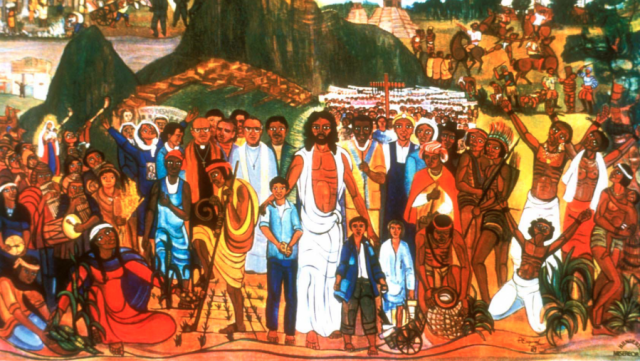As we delve into these texts, we’re reminded of the universal nature of God’s call. The invitation is open to all – the elite or the powerful are invited, likewise, God welcomes the marginalized, and ordinary people. Amos, a shepherd and dresser of sycamores, embodies this truth. His story challenges the established power structures and affirms that prophecy and justice can emerge from the margins.
Many of us struggle with impostor syndrome, feeling that we’re not equipped or qualified for the roles we’re called to. This self-doubt can be paralyzing, especially when we compare ourselves to the standards set by a world that values credentials, personal connections, and which university you come from over passion, courage, and calling. Amos’ story speaks directly to this fear. He was not a professional prophet, yet God called him to deliver a powerful message to Israel. This teaches us that a calling is not about fitting into worldly qualifications but about entrusting God and our inherent worth. It’s about summoning the courage and belief to step into our roles, regardless of our perceived inadequacies.
My journey to becoming a home missioner was not without its challenges. Before this, I worked odd jobs to make ends meet in the United States. I didn’t have a college degree, nor did I come from a wealthy family, nor did I have a lot of connections or experience before applying for my current position at a K-12 public school system. I felt highly unequipped. The colonial educational system I’m a part of often emphasized individuality, titles, achievements, and hierarchy, fostering a constant comparison to others. These systems can make us feel inferior as if we don’t belong in the roles we’re called to.
Our adoption into God’s family redefines our identities beyond colonial constructs of race, class, gender, ability, and status. These “colonial constructs” are the societal norms and structures that often make us feel inadequate or unworthy. Paul’s letter in Ephesians challenges us to recognize and celebrate God’s image in every person, cultivating a community that reflects the richness of Creation. We may feel unprepared or undeserving, but the Holy Spirit equips us with the necessary wisdom and knowledge. The Spirit’s presence and guidance affirm our courage to enter these roles.
In the Gospel, Jesus sends out the Twelve with minimal resources, teaching them to rely on the hospitality and generosity of others. The Twelve were ordinary folks, primarily fishermen, without formal religious training or societal status. This subverts the colonial mindset of domination and accumulation, highlighting the spirit of Bayanihan, which is communal and cooperative, where people help each other out. The disciples are empowered to heal and liberate, not through coercion or force, but through the transformative power of God’s love and justice. This power, which transcends human limitations, is what empowers us to step into our roles, not because we have perfect résumés but because we’re called and commissioned by Jesus.
As we reflect on these passages, let’s commit to a faith rooted in love and radical acceptance of the lived experiences of all people. Let’s be shepherds of love and just and lasting peace, embracing our calling to challenge oppressive systems and build a world where Kapwa-tao is more important than anything else. May we, like Amos, listen for God’s voice in unexpected places and respond with courage and faith, knowing that we’re part of God’s family, image, and likeness that seeks to transform and heal our world. We don’t have to have PhDs or Master’s degrees to understand that Israel’s ethnic cleansing of Palestinians, funded and supplied with U.S. bombs, is genocidal or that what’s happening in the West Philippine Sea’s conflict between the U.S. and China is nothing more than imperialism.
To those of us battling impostor syndrome, let these stories be a reminder that you’re enough. Your calling is not determined by earthly qualifications but by the divine wisdom and knowledge from our ancestors and elders given by the Spirit. Step into your vocation with courage; you’re chosen, equipped, and called to make a life-giving difference. You’re not an impostor but a significant collaborator of God’s justice and love. Believe in the transformative power of our Creator working through you, and know that you’re exactly where you need to be.
Gospel reflection of Jonah Ballesteros, Home Missioner, USA for the 15th Sunday in Ordinary Time.
Balik-Tanaw is a group blog of the Promotion of Church People’s Response (PCPR). The Lectionary Gospel reflection is an invitation for meditation, contemplation, and action.









